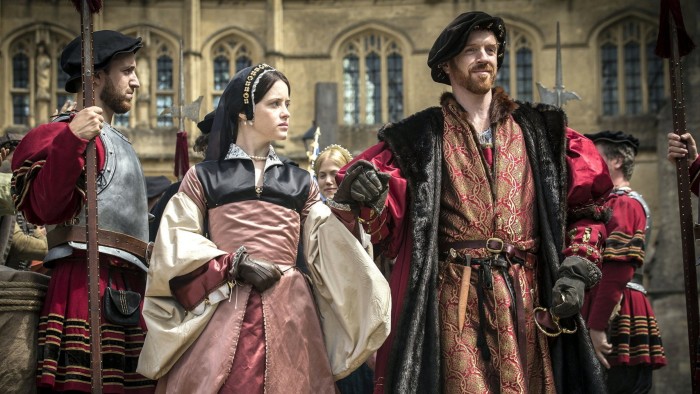Unlock the Editor’s Digest for free
Roula Khalaf, Editor of the FT, selects her favourite stories in this weekly newsletter.
The writer is a director and screenwriter
In 2014, I directed the BBC adaptation of Hilary Mantel’s Wolf Hall and Bring Up the Bodies, both winners of the Booker Prize. In 2023, I shot The Mirror and the Light, completing the trilogy. If we were to attempt to make either in 2025, we would not succeed.
Colin Callender, who persuaded Hilary to make the TV rights available, offered each of the major streamers the chance to collaborate on the original Wolf Hall series. They all passed. Six weeks from the start of shooting The Mirror and the Light, we were on the point of abandoning the project. Only when the leading actor, writer, director and producer agreed to hand back a significant proportion of their fees could we get it under way.
I wish Wolf Hall were the only example of this creeping paralysis in public service television. ITV’s Mr Bates vs The Post Office, which altered the national debate on a key issue, has left its makers in debt. The producer has said publicly that there would be no point trying to develop it for television now. Attracted by the tax breaks on offer in the UK, the deep-pocketed streamers have paid over the odds for cast, crew and locations. With costs inflated, the public service broadcasters can no longer afford to make high-end drama.
What do these programmes have in common? Their subject matter is of unique interest to a UK audience. But they are not likely to appeal to American viewers.
The streamers have made some stunning programmes. Adolescence and Toxic Town are clearly British stories. But their subjects — child radicalisation online; the effect of industrial waste on a local community — also have an American resonance.
The streamers have no interest in making programmes that are of exclusive interest to the UK: Mr Bates, Three Girls, Anne. Only the UK public service broadcasters will tell these stories. We need to ensure that, in pursuing their legitimate business model, the streamers don’t drive those public service broadcasters out of business.
This week, the cross-party culture, media and sport committee has unexpectedly endorsed a levy on major streamers. It said that 5 per cent of UK subscriber revenue should be used to make programmes of specific interest to UK audiences. This is hardly radical: 17 other countries in Europe are already doing this. Netflix challenged that decision in the French and German courts and lost. Back in 2018, when I first raised the idea of such a levy in the UK, I asked Reed Hastings, co-founder and executive chair of Netflix, if he would mount a similar challenge here. “Not if it was a level playing field across all the streamers,” was his answer.
Streaming companies will claim that a levy will reduce UK inward investment. In my view, a 5 per cent holdback won’t affect how many programmes they make here at all. The decision to produce in the UK will be based, as it always has been, on hard-headed financial considerations; access to writers, actors, directors and crew; generous tax breaks; common use of the English language. The introduction of a levy won’t increase the actual cost of production in the UK by one penny.
Public service broadcasting high-end drama production fell by 25 per cent last year, to the lowest level since 2019. The select committee believes the levy will change this. It’s a brave decision, in light of the current attitude of the US government. But it’s the right one. The levy is neither a tax nor a tariff. Why? Because the streamers can themselves apply to make a programme with money from the levy fund — the only proviso being that it is made in co-production with a UK public service broadcaster.
The levy would solve the problems faced by public service broadcasters at a stroke. The only question remaining is whether this government has the guts to face down the US and protect the long tradition of public service television in this country.
